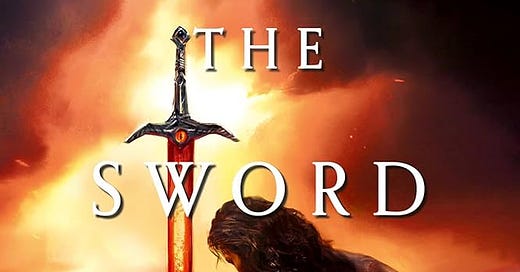If there's one thing you've probably gathered about us at Kaiju & Gnome by now, it's our unabashed adoration for Gareth Hanrahan's The Sword Defiant. It ranked high among both Ed's and my personal favorites last year, and it's a title I've eagerly recommended and gifted to numerous acquaintances since then. Heading into The Sword Unbound, I harbored a blend of anticipation and uncertainty. I held out hope for the possibility of Jan making a cameo, perhaps shedding light on her enigmatic departure from the mortal realm. Above all, I anticipated greatness from this sequel. My expectations were lofty yet nebulous.
Let's delve into the topic of expectations, because they form the crux of the narrative Gareth Hanrahan weaves. Once upon a time, a band of friends defied astronomical odds to save the world. They sacrificed one of their own, perhaps their finest, in the process. Yet, their heroism came with a heavy burden—society now expected them to embody the ideals of chivalry, to serve as arbiters of righteousness at the behest of church and kingdom. These expectations proved impossible to fulfill. Laerlyn and Gundan found themselves torn between societal demands and the obligations thrust upon them by their respective races. Blaise found his fate intertwined with an organization that once spurned him, while Jan, tasked with representing the church, grappled with a crisis of faith. Alf, simply a warrior at heart, struggled to meet the aristocracy's grandiose expectations. This plight extends to our entire cast of heroes, none of whom can—or truly desire to—fulfill society's demands.
Years have passed, yet the weight of expectation still hangs heavy upon them, propelling the events of this unfolding saga. Indeed, their defiance of societal norms has been the driving force behind the trilogy's inception. So, it should come as no surprise that The Sword Unbound defied all my expectations, save for one—that it would be exceptional.
Without divulging spoilers, this installment surprised me at every turn. It shines a spotlight on the supporting cast, delving deeper into characters like Alf's sister and nephew (the latter possibly embodying Peir now), as well as reintroducing figures like Bor and Cu, who had faded into the background. The narrative even takes an unexpected turn by offering a fresh perspective from a wholly unexpected character, culminating in a twist I couldn't have envisioned.
Despite its unpredictability, the book delivers everything I've come to expect from Hanrahan's pen. The characters are richly drawn, blending D&D archetypes with He-Man-esque action. Alf remains a profoundly relatable protagonist, his humanity palpable at every juncture. The remaining members of the Nine continue to impress, with Blaise's character development standing out as a highlight. Furthermore, the addition of the ranger class injects a new dynamic into the story, while Spellbreaker remains a standout as one of fantasy's most memorable sentient swords.
The action sequences are exhilarating, punctuated by breathtaking fantasy set pieces. The climactic battle is executed with precision, leading to a resolution that caught me off guard. As I reached the final pages, I found myself unable to predict what lies in store for Book Three. If you had told me this was intended to be a duology, I would have believed you, were it not for the tantalizing promise of a third installment slated for 2025.
In the end, it all circles back to expectations. As I closed the book, I found myself devoid of any preconceived notions. What lies ahead? I haven't the faintest idea, and that's precisely why I'm eagerly anticipating the next chapter. Gareth Hanrahan has crafted a narrative so uniquely enthralling that it defies prediction, leaving me craving more.



